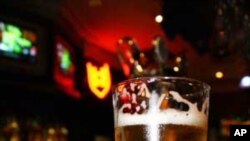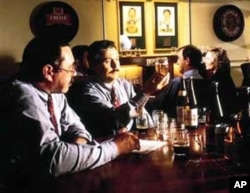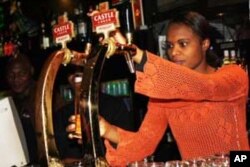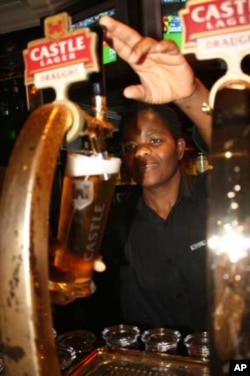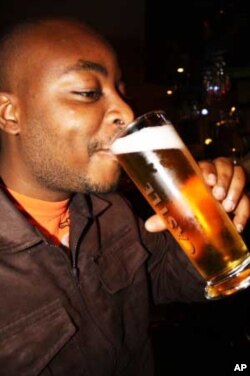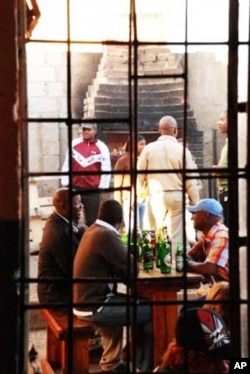The regulars of Tiny’s Tavern, a shabby drinking hole in the sprawling township of Atteridgeville on the outskirts of South Africa’s capital, Pretoria, are accustomed to Mpiti Molefe’s eccentric behavior. But they still laugh uproariously when the young man lifts his shirt to shake his small but rotund pot belly.
“See,” Molefe shouts, pointing to his fleshy stomach, “Even small man like me, we drink lot of beer in Mzansi (South Africa). If the foreigners coming here for World Cup do not drink the beer, they must then rather stay at home!”
Then Molefe leans back on his stool and gulps deeply from a quart of beer. He wipes excess froth from his lips with the back of his hand, slams the bottle down and bellows at the barman in the local Sotho language, “Hey, you! Are you blind? Or dead? Give me another Zamalek!”
Molefe uses the nickname for Carling Black Label, one of South Africa’s most popular beers. South Africans have so named the brew because its label sports the same red and black colors as those of top Egyptian football team, Zamalek.
The analogy offers further proof that in South Africa, “beer and football cannot be separated,” says Molefe’s “drinking partner,” Anthony Msimango.
Beer sales expected to soar
According to South African Breweries (SAB), one of the world’s largest beer manufacturers, South Africans drink almost 60 liters of beer per person every year. The country is Africa’s top consumer of the beverage, and one of the globe’s biggest beer markets. Seven huge SAB factories churn out more than 25 million hectoliters of beer (1 hectoliter = 100 liters) annually.
However, South Africa still lags far behind the world’s top beer quaffing nation, the Czech Republic, where people consume about 160 liters each per year. The Czechs failed to qualify for the 2010 World Cup, but hundreds of thousands of other famous beer lovers – like the English, Germans and Australians – are on their way to Africa’s first football World Cup.
Alistair Hewitt, a manager at SAB, says beer sales will “soar” during the month long football fiesta to be attended by hordes of international football fanatics – many of them beer drinkers.
“We expect to sell an additional 100,000 hectoliters, which is about 20 million beers, in a 500 ml glass,” Hewitt tells VOA in his plush office in Sandton, Johannesburg. “All our breweries have brewed additional capacity for the World Cup. And we’ll be able to turn on the (extra) taps quite fast if we see demand is running ahead of our expectations,” he adds.
SAB is placing refrigerated trucks packed with cold beer “on standby in key match areas to ensure that thirsty fans can always get ice cold beer.”
Europeans mostly drink their beer at room temperature, but South Africans enjoy cold beer. Even in the midst of winter – when the tournament is to be held - warm beer is anathema to them.
Universal language of beer
The SAB manager says South Africa’s passion for good beer goes hand in hand with its passion for sport, especially football. On weekends, in suburban pubs and township shebeens - or informal drinking dens - South Africans of all races and classes get together to socialize and watch the big games
“Beer drinking is sort of a universal language here,” Hewitt offers, adding, “But of course it wouldn’t be this way if our beer was bad.” South Africa enjoys an international reputation for fine beer. SAB’s multiple award-winning flagship Castle brand is especially held in high regard by beer experts.
Hewitt explains, “In European countries you get very good tasting beer. In the Americas you get very refreshing beer. Castle’s a combination of taste and refreshment.”
He says South African beers contain only “natural” barley, hops, maize and water. “Our barley comes from the Americas; some of our hop strains come from Europe. And we also make a lot of our own ingredients in South Africa. We’ve got hop farms down in (the south coast city of George) and some of our maize that gives our brands a lot of drinkability (sic) also comes from South Africa.”
Bitter about Bud
South African beer drinkers are extremely loyal to local beer brands they consider part of their culture, like Castle and Carling Black Label. Many are complaining about the rule made by international football organization FIFA that only American Budweiser beer is to be sold inside the country’s World Cup stadiums.
On the outskirts of Johannesburg, construction workers are applying the finishing touches to a parking lot at the Soccer City Stadium. One of the sweating laborers, Vernon Jacobs, says it’s “very disappointing” that only American beer will be for sale inside the stadium he’s helped build. Jacobs says he’s tasted Budweiser and “it’s water, not beer! There’s no flavor to it.”
His pickaxe-swinging colleague, Solomon Mkhuma, agrees. “In South African stadiums, we normally drink Castle. In fact, we drink all the beers we want to drink (of our choice) in our stadiums,” he says. Shaking his head, Mkhuma asks, “How can we call this the African World Cup when we are not even allowed to drink African beer in our very own African stadiums?”
But Hewitt says South African beer loving football supporters “shouldn’t be so perturbed by this Budweiser situation…. Outside of the 90 minutes of football (in a particular match in a stadium), they’ll be able to get (South African beer) across the nation.”
Also, because it won’t be able to meet the great demand, Budweiser has relinquished its rights to monopolize beer sales in the 10 fan parks across South Africa. So the host country’s beer will be on sale in these locations.
But this isn’t enough to satisfy Webster Dladla. Perched on his favorite seat in the Bulldogs pub in the Johannesburg suburb of Rosebank, he tells VOA, “I have been drinking lots of beer in my life; very lots. And Castle is the only beer that does not give me a babbelas (hangover). That is the only reason I drink Castle. But I think it is a very good reason.”
Dladla then takes great pride in announcing that he has a ticket for the South Africa versus Uruguay game in Pretoria. But he’s shocked when informed that he’ll be permitted to buy only Budweiser inside the Loftus Versveld ground on June 16. Dladla scoffs that he’ll do everything possible to ensure he drinks Castle while watching his team. He adds, “There are many ways to kill a cat….”
But Dladla is unlikely to succeed in his mission to imbibe his favorite South African beer inside the stadium. If he attempts to smuggle it into the arena, FIFA security officers will probably confiscate his brew.
In the meantime, at breweries all over South Africa, bottles of beer roll off the production lines in preparation for the football spectacle - and possibly for one of the biggest beer swilling events the globe will ever see.




